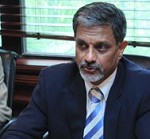The India-Latin America relationship has gained much momentum over the past decade. What are India’s future prospects in Latin America? Ambassador Deepak Bhojwani, former Indian Ambassador to Venezuela, Cuba and Colombia shares his insights with Gateway House’s Hari Seshasayee, on why a good relationship with Latin America is significant for India’s food and energy security.
What can we expect from the upcoming presidential elections in Venezuela? Given that India imports a significant amount of oil from the country, do you see a change in policy depending on the outcome of the elections?
I don’t see the incumbent President Hugo Chavez losing easily. Nevertheless, at the moment Venezuela has many financial problems, such as massive inflation and currency issues. It is a difficult country to trade with, especially due to the control on the dollar. The CADIVI, a government body which administers currency exchanges, is selective and some allege it is a political tool used against those antithetical to the regime. Regardless of the outcome of the elections, trade will continue to be affected.
For India, another concern is our projects on hydrocarbons in Venezuela. The question here is, how fast will PDVSA (the national oil company) move and how much will they invest in our joint projects? We already have a joint venture in Carabobo, Venezuela, with ONGC Videsh, Indian Oil Corporation and Oil India in a consortium with Spain’s Repsol and Malaysia’s Petronas. A large flow of oil, 400,000 bpd, is expected by 2016. A lot will now depend on how strongly Chavez comes out in the elections, and if they chose to further tweak the taxation regime, for instance.
Is there a difference in India’s policy between the ALBA countries (a group consisting of eight socialist countries in Latin America) and the other, more right-wing countries in Latin America?
India follows a policy tailored more in bilateral terms, through country-specific agreements and initiatives. Though Venezuela is an ALBA country, we don’t subscribe to Hugo Chavez’s rhetoric. We also do not involve ourselves in bilateral disputes between the U.S. and Cuba, for instance, and steer clear of ideological compulsions.
Brazil is a key player in the region and India has increased its political engagement with the country – bilaterally and also through BRICS and IBSA. How can we better leverage our goodwill with Brazil? And what can we expect in terms of future investments?
We should treat Brazil as an entity on its own. It is so huge that it can absorb as much investment as we have to give and as much interest as Indian business can have. There’s no ruling out triangulation and multilateral collaboration with Brazil, and they will be a tremendous partner. We have already invested in oil and gas ventures and there may even be a possibility of considering ventures in other minerals – though it is not going to be easy.
Brazil is also a gateway to Latin America. From Brazil, you can connect to other parts of the region. Mahindra & Mahindra has a plant to assemble its Scorpio cars in Manaus, Brazil. Since Manaus is a free trade zone, there are no duty implications. Then there is only a matter of working out the logistics of exporting these cars from Manaus to other countries in the region.
Is there potential for India to work with Latin America on addressing two of its main issues, those of energy and food security?
I think it’s inevitable. Companies such as ONGC Videsh, Reliance and Essar already have a presence there. We are going to see more hydrocarbon investments; not only in traditional oil-producing countries like Venezuela and Brazil, but also in others like Peru and Colombia.
Another frontier area which has not yet been explored is coal. Hopefully, given all the implications that are attendant in terms of ecological issues, land rights etc., it will prosper. We’re increasingly finding that we have to go abroad for coal. A lot of Latin American countries, like Colombia, Peru and Brazil, have significant deposits of coal. Much remains to be seen though, since neither the coal mining or shipping is easy.
So in the larger context of India’s energy security, how important is Latin America?
It is extremely important. Venezuela alone has reserves of almost 300 billion barrels – equivalent to Saudi Arabia’s reserves. Other countries are also finding new reserves, like Brazil in its off-shore zone, while Bolivia and Peru are finding more gas reserves. But the question is two-fold: one, to find reserves in exploitable quantities, in a manner wherein you can also ship the oil once it is drilled. The other question is of the juridical regimes that prevail in the countries concerned. Ecuador, for example, has been a non-starter for us because of the juridical regime.
And in terms of food security, what should be India’s next step?
For food security, we have to go corporate. We need to consolidate our relations economically with countries that are potential food exporters. Not only with Brazil and Argentina, but also with Peru, which exports all kinds of food products and even has a possible Pacific connection.
How do we consolidate this?
It will have to be through private sector initiatives. We have to make new investments. We also have other suppliers like Indonesia and Malaysia who provide us with palm oil. It doesn’t hurt to diversify sources and if you can find a more investment-friendly regime in Argentina or Brazil, more joint ventures can be set up.
Ambassador Deepak Bhojwani is the former Indian Ambassador to Colombia, Venezuela and Cuba.
This interview was exclusively conducted for Gateway House: Indian Council on Global Relations. You can read more exclusive content here.
For interview requests with the author, or for permission to republish, please contact outreach@gatewayhouse.in.
© Copyright 2012 Gateway House: Indian Council on Global Relations. All rights reserved. Any unauthorized copying or reproduction is strictly prohibited.


